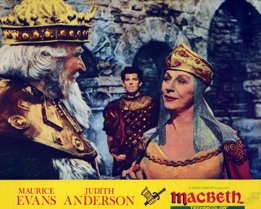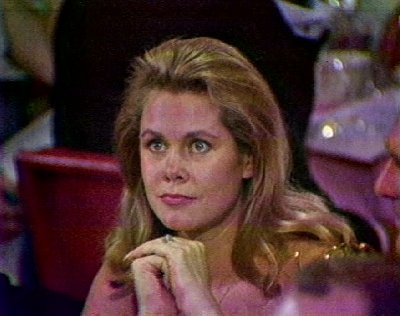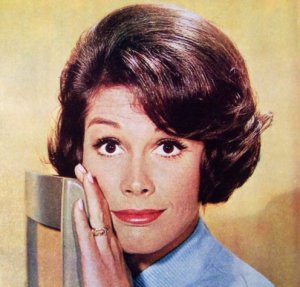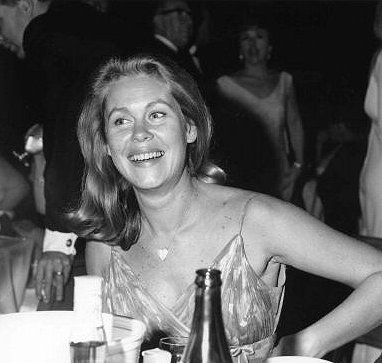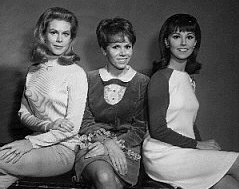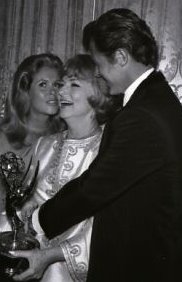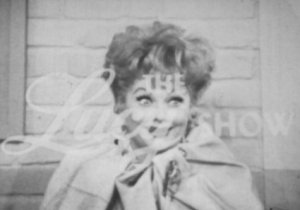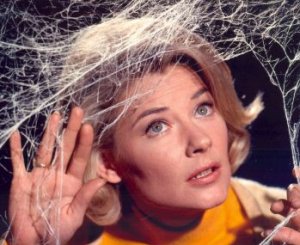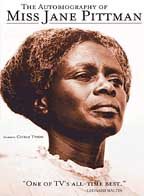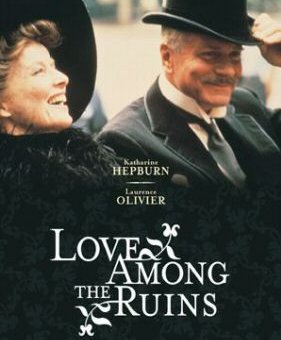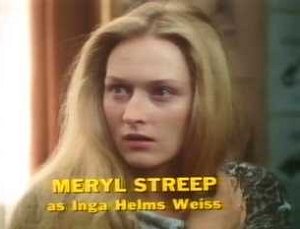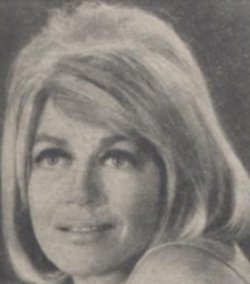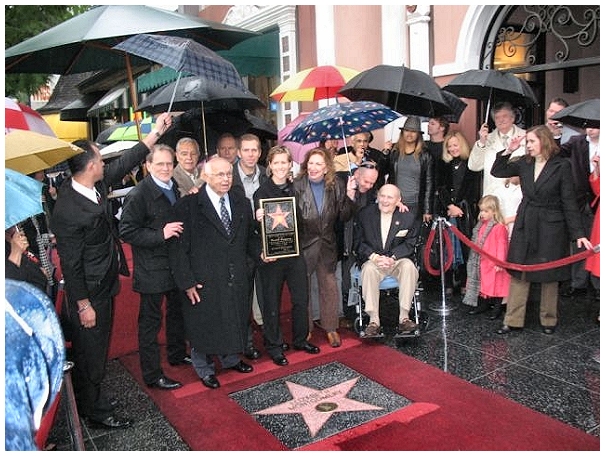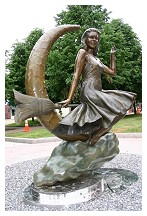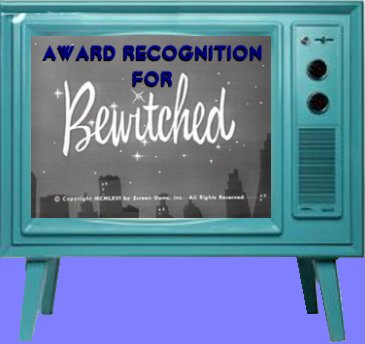
By Adam Gerace with contributions by David Pierce An award to recognize the achievements of a television series can mean much more than the statue or plaque and the obligatory acceptance speech. It can aid bargaining and contract negotiation for its newly crowned award-winning stars. It can lead to new viewers discovering this critically-acclaimed series. It could even save a series from cancellation. And, for the fans, it can mean that their favorite shows and their makers are duely recognized for their creative efforts. Indeed, often asked questions by Bewitched fans include: How many awards did Bewitched win? Did Elizabeth ever win an Emmy? If not for ‘Bewitched', did she for anything else? What about Dick and Agnes? And later on, Dick Sargent? How about the supporting cast? Were the crew ever honored? In short, Bewitched was a regularly-nominated program at the awards ceremonies of its day. For example, the show received 22 Emmy nominations, one more than Make Room for Daddy (1953-1965), 13 more than The Andy Griffith Show (1960-1968), and only three less than the critical darling of the sixties, The Dick Van Dyke Show (1961-1966). However, for the most part it was somewhat overlooked in terms of wins, with its lead stars going home empty-handed and its directors and writers virtually unnoticed (even in nominations). In spite of this, there were several moments of award recognition for the series, perhaps most notably at the Emmy awards. Bewitched actually received no Emmy nominations for its first season on television (although the series itself had perhaps the more telling accolade of being the second highest-rated show for the 1964-1965 season according to the A. C. Nielsen company, bested on by NBC's Bonanza). This is not particularly surprising, though, since the 1965 Emmy nominations moved away from what had been the more traditional (and still used, with some changes) categories. Instead of separate awards for different types of programs (e.g., continuing series, specials), and performers (actors, variety performers) more encompassing categories were included with several winners chosen. Thus, there was an “Outstanding Program Achievement in Entertainment” award, whose recipients were The Dick Van Dyke Show, Hallmark Hall of Fame (episode: “The Magnificent Yankee”), My Name is Barbra, and New York Philharmonic Young People's Concerts with Leonard Bernstein (episode: “What Is Sonata Form?”); an “Outstanding Individual Achievements in Entertainment (Actors and Performers)” award (going to Dick Van Dyke for his sitcom, Alfred Lunt and Lynn Fontanne for the Hallmark Hall of Fame episode, Barbra Streisand for her special, and Leonard Bernstein for his series), and so on. Perhaps a new show attempting to secure a place amongst existing programs (e.g., Hallmark Hall of Fame, Bonanza), single programs of such critical acclaim (such as the Streisand special), and in such encompassing categories was too hard a task. In fact, of the 20 highest-rated programs of 1964-1965, only four received an Emmy nomination. The following year the Emmys returned to their previous format, as well as providing some slight (but logical given the growth of television and other related areas) changes. For example, categories for continuing series performers which had not previously differentiated between dramatic and comedy programs were replaced with separate categories for those who worked within these genres (for both lead and supporting performers). More importantly, this was also the first year that Bewitched was nominated, securing five Emmy nominations. The series was nominated for “Outstanding Comedy Series” (producer: Jerry Davis), although the series, Batman, Get Smart, and Hogan's Heroes lost to the last season of The Dick Van Dyke Show. Elizabeth Montgomery received her first nomination for the series for “Outstanding Continued Performance by an Actress in a Leading Role in a Comedy Series”. Her fellow nominees were Lucille Ball (The Lucy Show) and Mary Tyler Moore ( The Dick Van Dyke Show), with Moore winning her second Emmy for her series. This was Montgomery's career second nomination, having first being nominated in 1961 for “Outstanding Single Performance by an Actress in a Leading Role” for her appearance in The Untouchables episode “The Rusty Heller Story”. Interestingly, Judith Anderson won that award for the television special Macbeth (Ingrid Bergman of Twenty-Four Hours in a Woman's Life was the other nominee), while her co-star took home the male award for his portrayal of Macbeth: none other than future Bewitched co-star, Maurice Evans.
Daddy does his thing: Maurice Evans and Judith Anderson in their Emmy winning roles in Macbeth
Elizabeth Montgomery during Announcement of the Lead Actress Nominees at the 1966 Emmy Awards Both Agnes Moorehead and Alice Pearce were also nominated in 1966 for “Outstanding Performance by an Actress in a Supporting Role in a Comedy ” along with Rose Marie (incidentally, a good friend of future Bewitched co-star Kasey Rogers) for the Van Dyke series. Pearce was awarded the Emmy posthumously. The beloved Mrs. Kravitz had passed away on March 3, 1966 after a battle with cancer. Montgomery presented the Emmy that night (May 22), with Pearce's husband (and Bewitched writer/director) Paul Davis accepting the award. He said on accepting her award, “I ask you to join me in a toast to a wonderful actress, a great human being, and the most delicious wife a man could've had” ( The Newark Advocate, May 23, 1966, p. 20). The series would also best another Van Dyke alumni that year, with William Asher being recognized for “Outstanding Directorial Achievement in Comedy”, beating Jerry Paris from that series and Paul Bogart (Get Smart ).
Mary Tyler Moore took home the 1966 Emmy for The Dick Van Dyke Show
Win or lose, Elizabeth Montgomery beams at the 1966 Emmy Awards In 1967 the show was again nominated for five awards. The series, itself, was again nominated (producer: William Froug), although it, Get Smart, Hogan's Heroes, and the comparably older (beginning in 1960) The Andy Griffith Show were bested by The Monkees at the June 4 show . Montgomery was again nominated in the lead actress category, along with Marlo Thomas (for her first season of That Girl ) and Moorehead (to see Moorehead's nomination notification visit The Agnes Archives). This time, Lucille Ball walked away with the award. Moorehead biographer Charles Tranberg suggested that “It is really no surprise though that neither Agnes nor Elizabeth emerged victorious…because they no doubt cancelled each other out” (2005, p. 272) (certainly, such a concern seems to be prevalent when networks nominate their leading stars for awards, although notable exceptions include Bea Arthur, Betty White, and Rue McClanahan who all won Emmys for The Golden Girls but were nominated against each other in each of their respective winning yeas; and Edie Falco who bested her The Sopranos co-star Lorraine Bracco in both 1999 and 2001).
Neither Marlo Thomas or Elizabeth Montgomery (seen here with Judy Carne of Love on a Rooftop in an 1966 ABC promotional shot) Took Home Emmys for their Classic Series Agnes Moorehead did not, however, go home empty-handed. She was awarded by Montgomery and Robert Culp the “Outstanding Performance by an Actress in a Supporting Role in a Drama” Emmy for her guest turn in The Wild Wild West” (episode: Night of the Vicious Valentine—to see a congratulatory note from Joan Crawford to Moorehead, see The Agnes Archives). Incidentally, the other nominees were Tina Chen (for an episode of CBS Playhouse) and Ruth Warrick (Peyton Place), who was one of Orson Welles's Mercury Players (as was Moorehead). Asher again received a directing nomination, although it was James Frawley (The Monkees) who received the award (other nominees were Family Affair's William D. Russell, I Spy's Earl Bellamy, and The Lucy Show's Maury Thompson). Marion Lorne also received her first nomination for the series for “Outstanding Performance by an Actress in a Supporting Role in a Comedy” (she had been previously Emmy-nominated three times for other work: twice for Mister Peepers and once for Sally ), although it was Frances Bavier ( The Andy Griffith Show ) who was awarded the statue over Lorne and Nancy Kulp ( The Beverly Hillbillies ).
Robert Culp with those Bewitching Women, Elizabeth Montgomery and her Emmy-winning Co-star Agnes Moorehead The show's fourth season saw the series (producer: William Asher) and Montgomery again receive nominations. Get Smart won over Bewitched, Family Affair, Hogan's Heroes, and The Lucy Show, while Lucille Ball (in the final season of her series) won over Montgomery, Barbara Feldon (Get Smart ), Paula Prentiss (He & She) and Marlo Thomas (That Girl). Dick York finally received a nomination for his work (“Outstanding Continued Performance by an Actor in a Leading Role in a Comedy Series ”), although it was the star of the comedy series winner, Don Adams, who took home his second Emmy (other nominees were Family Affair's Brian Keith and Sebastian Cabot and He & She's Richard Benjamin). Moorehead was nominated in the supporting actress category (along with Marge Redmond of The Flying Nun, and Nita Talbot for an episode of Hogan's Heroes ). This time it was Aunt Clara's creator, Marion Lorne who won. Again the award (bestowed on May, 19) was bittersweet for Bewitched, with Lorne having passed away on May 9, 1968. It was Elizabeth Montgomery who accepted Lorne's award, saying “We owe her a big thanks for all the happiness she brought us” (Delaware Daily County Times, May 20, 1968, p. 2).
Lucille Ball won two Emmys for The Lucy Show At the 1969 ceremony (June 8), Get Smart would again best the series (producer: William Asher) and Family Affair (other nominees were The Ghost & Mrs. Muir and Julia). Montgomery and Barbara Feldon were again beaten (along with Diahann Carroll for Julia); this time by Hope Lange for The Ghost & Mrs. Muir. Moorehead received a nomination for “Outstanding Continued Performance by an Actress in a Supporting Role in a Series,” but she and Barbara Anderson (Ironside) were beaten by Susan Saint James (The Name of the Game). For their first series without Dick York, both Montgomery (“Outstanding Continued Performance by an Actress in a Leading Role in a Comedy Series”) and Moorehead (“Outstanding Performance by an Actress in a Supporting Role in Comedy”) were awarded 1970 Emmy nominations (the awards were given out June 7). Neither Montgomery nor other regular nominee, Marlo Thomas, could beat Hope Lange (whose show, incidentally, had made the switch from NBC to ABC), and Moorehead and Lurene Tuttle ( Julia ) were beaten by Karen Valentine ( Room 222 ). For the show's seventh season (and the final time it would receive Emmy nominations), it was Agnes Moorehead who received an acting nomination in 1971 (with Moorehead and Valentine losing out to Valerie Harper of Mary Tyler Moore at the May 9 ceremony). Rolf J. Miller received a nomination (“Outstanding Achievement in Makeup ”) for his makeup work in the episode “Samantha's Old Man,” which saw Darrin and Samantha transformed into older versions of themselves (he by Endora, she by herself). Robert Dawn ( Mission Impossible) took home the award over Miller, Marie Roche ( Hallmark Hall of Fame episode “Hamlet”), and Harry Blake and Perc Westmore (The Third Bill Cosby Special).
Lange in The Ghost and Mrs. Muir - Won in 1969 and '70 Earlier in the year (March 21, 1971) the Bewitched episode “Sisters at Heart” (the favorite episode of both Montgomery and Erin Murphy) was among those presented with an award by the National Academy of Television Arts and Sciences at a presentation at the Hollywood Palladium hosted by Mike Connors. Joyce Haber writing in anticipation of the event suggested that “Elizabeth Montgomery and her husband, producer-director Bill Asher, will be estatic on Sunday at the Hollywood Palladium for the awarding of a special Emmy” ( The Victoria Advocate, March 21, 1971, p. 7). The Fresno Bee (May 2, 1971, p. 17-TV) later reported that:
The article described how Saunders used Bewitched as a tool to educate her class on the making of a television series, with Elizabeth Montgomery and William Asher inviting the class to sit in on production meetings, filming, and by providing access to scripts. “Last year, to thank the Ashers for their interest, the students wrote a script for “Bewitched.” Their gift, “Sisters at Heart,” was developed into a teleplay by writer Barbara Avendon and was telecast on Christmas Eve, 1970.” (for more on the episode, see the article The Secret Liz Montgomery Shares with Her Husband). After Bewitched ended, Elizabeth Montgomery was nominated for an Emmy award in 1974, this time in the category “Best Lead Actress in a Drama” for the telefilm A Case of Rape, one of her most highly-regarded (and highest-rated) roles. She was nominated against her friend Carol Burnett (6 Rms Riv Vu), Katharine Hepburn (The Glass Menagerie), Cloris Leachman (The Migrants), and the winner, Cicely Tyson ( The Autobiography of Miss Jane Pittman ). In addition to Montgomery, her regular director Boris Sagal (who had first directed her in a 1961 Playhouse 90 episode “The Spiral Staircase”, in which she co-starred with her then-husband Gig Young; he would again direct her in the 1978 miniseries The Awakening Land and 1981's When the Circus Came to Town ) received the film's other Emmy nomination (notably, writer Robert E. Thompson received a 1975 Edgar (Allen Poe) award nomination for “Best Television Feature or Miniseries”). The very next year Montgomery received another Emmy nomination (“Outstanding Lead Actress in a Special Program – Drama or Comedy”) for her turn as Lizzie Borden (another of her most highly-regard roles), in The Legend of Lizzie Borden (the telefilm received a total of five Emmy nominations, winning two; received a 1976 Golden Globe nomination for “Best Motion Picture Made for TV”, and writer William Bast took home the 1976 Edgar award for “Best Television Feature or Miniseries”). It was Katharine Hepburn (for Love Among the Ruins ) who took out the Emmy award, with Montgomery, Jill Clayburgh ( Hustling ), and Diana Rigg ( In This House of Brede ) going home empty-handed. Montgomery's final Emmy nomination was in 1978 for “Outstanding Lead Actress in a Limited Series” for the three-part The Awakening Land. Her fellow nominees were Rosemary Harris for Holocaust , Lee Remick for Wheels , Cicely Tyson for King , and Meryl Streep (the recipient), also for Holocaust . The program in total received six nominations.
Tyson in The Autobiography of Miss Jane Pittman - Won in 1974 Elizabeth Montgomery was twice nominated against Katharine Hepburn for an Emmy.
Hepburn in Love Among the Ruins - Won in 1975 Montgomery's last nomination was in 1978 for Outstanding Lead Actress in a Limited Series for her role in the three part mini-series The Awakening Land. The award went to Meryl Streep in Holocaust.
Streep in Holocaust - Won in 1978 If it seems somewhat implausible today that Montgomery never won an Emmy, the strange occurrence did not go unnoticed during Bewitched and during her later turn to television dramas. In an article in the News Journal (May 29, 1970, p. 12), Harvery Pack provided an acerbic attack on the Emmy awards, suggesting that, “ The Oscar Awards are the most glamorous; the Tony Awards the most sophisticated; and the Emmys, TV's contribution to the annual awards mania, easily the most ludicrous.” He particularly singled out Montgomery for comment:
Similarly, Vernon Scott wrote in a 1978 The Sunday-Chronicle Telegram article (February 19, 1978, p. G-5) that “Elizabeth Montgomery, one of the best actresses in television, may hold the record for the longest losing string among leading ladies of the tube.” As Scott, however, continued, “While Elizabeth's mantle may be empty of Emmys, she doesn't want for the best roles television has to offer. Year after year she has her choice of dramatic roles in top flight productions at premium salaries.” Montgomery shared her perspective (at once reverent and humorous) on it all:
She would reflect in a similarly lighthearted way when discussing the subject with Herbie J Pilato for his 1992 book, suggesting a project with other perennial Emmy-bridesmaid Susan Lucci (Lucci received 18 Daytime Emmy nominations for All My Children, before finally taking home a statue in 1999): “Maybe the two of us should work together,...do something really brilliant, and then both lose. That would be extremely comical” (quote from Pilato's 1996 book, p. 42). With respect to Bewitched and other awards, it was only Montgomery who received a Golden Globe nomination for the show. In fact, she received four of them. In 1965 the award (“Best TV Star – Female”) went to Mary Tyler Moore, over Montgomery, Yvette Mimieux (for an episode of Dr. Kildare ), Julie Newmar (My Living Doll, later to guest on Bewitched), and Dorothy Malone (Peyton Place). In 1967 the same award went to Marlo Thomas, with the other nominees Montgomery, Barbara Stanwyck ( The Big Valley ), Barbara Eden (I Dream of Jeannie), and Phyllis Diller (The Pruitts of South Hampton). In 1969, it was Diahann Carroll and not Montgomery, Doris Day (The Doris Day Show), Hope Lange, or Nancy Sinatra (The Nancy Sinatra Show) who took home the award. In 1971, Montgomery received her final Golden Globe nomination (“Best TV Actress – Musical/Comedy”), but it was Mary Tyler Moore who was awarded the statue. The other nominees were Carol Burnett ( The Carol Burnett Show ), Juliet Mills (for one of the final fantasy sitcoms of the 1960-1970s, Nanny and the Professor ), and Shirley Jones ( The Partridge Family ).
Dorothy Malone from Peyton Place The American Cinema Editors organization twice nominated Bewitched for an Eddie award. Michael Luciano and Gerard J. Wilson, who were the editors for the episode “I, Darrin, Take This Witch Samantha”, were nominated in 1965 for “Best Edited Television Program.” It was Gene Fowler Jr. who won for an episode of Rawhide (other nominees were Joseph Dervin for an episode of The Man from U.N.C.L.E. , Daniel A. Nathan for an episode of Slattery's People , and Gene Palmer for an episode of Wagon Train ). In 1968, Bewitched editor Aaron Nibley received a nomination in the same category for the episode “A Most Unusual Wood Nymph”. Desmond Marquette won for an episode of The Big Valley (the other nominees were Harry Coswick for an episode of Daniel Boone, Jodie Copelan for an episode of The Fugitive , Harry W. Gerstad for an episode of The High Chaparral, Edward W. Williams for an episode of Ironside, and none other than Gerald Wilson, this time for Gunsmoke ). In more recent years, the show and its stars have received other accolades, perhaps in some ways righting the oversights of the past. In 1995 Montgomery was posthumously honored by the Women In Film organization ( http://www.wif.org/ ) with a Lucy Award. According to the organization, “They were named for Lucille Ball, who was not only a legendary actress and comedienne, she was also a producer, studio owner, creator and director. They are given to recognize women and men and their creative works that exemplify the extraordinary accomplishments she embodied; whose excellence and innovation have enhanced the perception of women through the medium of television.” Other recipients that year included Tracey Ullman, Imogene Coca (who guested on Bewitched ), Fred Silverman, and Brianne Murphy. On January 4, 2008, Rebecca Asher and her brother Bill accepted on their mother's behalf her Star on the Hollywood Walk of Fame for her contribution to television. Among those attending the unveiling by Hollywood Honorary Mayor Johnny Grant were Bewitched co-stars Bernard Fox and Erin Murphy, William Asher, speakers Liz Sheridan and Montgomery's husband Robert Foxworth, The Legend of Lizzie Borden writer William Bast, author Mark Wood, and of course the Asher-Montgomery families. Montgomery joins Agnes Moorehead, who received a star for her contribution to motion pictures.
Elizabeth Montogmery Receives Hollywood Walk of Fame Star in 2008 Bewitched has also been recognized by the viewers of cable television station TV Land, which gives out awards (in a number of fun categories) to classic television shows in ceremonies well-attended by surviving members of the casts and crews of these shows. Bewitched has won five TV Land awards: in 2003 “Favorite Classic TV In-Law” (Agnes Moorehead), and “Nosiest Neighbor” (Alice Pearce and Sandra Gould); in 2004 “Superlatively Supernatural” (Elizabeth Montgomery), and “Irreplaceable Replacement” (Dick Sargent); and in 2006 “The Most Irreplaceable Replacement” (Dick Sargent). The show was also nominated in 2003 for “Favorite Dual-Role Character” (Elizabeth Montgomery), “Funniest Food Fight” (in “Samantha's Power Failure”); in 2004 for “Favorite ‘Big, Bad Momma'” (Agnes Moorehead), and in 2006 for “Favorite Dream Sequence” (“I Confess”). The station also placed a statue of Samantha in Salem, Mass. in 2005.
TV Land's Bronze Tribute to Samantha at Lappin Park in Salem, MA In its time, Bewitched received a number of accolades or accolade nominations. Whether the show received as many awards as it should have, perhaps Richard Michaels's comments to Herbie J Pilato (1996, p. 42) regarding Liz's Emmy nominations sum up best what Bewitched fans think and feel about it all: “Even though the Emmy is a major form of acknowledgement in the industry, it's not the only one in the world. Audiences adore Elizabeth just as much as they did in the 1960s, and no one will ever forget her or the show.” References Academy of Television Arts & Science: Awards http://www.emmys.tv/awards/index.php American Cinema Editors http://www.ace-filmeditors.org/newace/intro.html ‘Cosby, Stanwyck win, Van Dyke Show takes 4 Emmys', The Newark Advocate , May 23, 1966, p. 20. Haber, J. ‘She Packs Own Lunch to “21”', The Victoria Advocate, March 21, 1971, p. 7. Marth, M. (Ed.). ‘KNBC Walks Off with Five Emmys', The Valley News and Green Valley Sheet , March 25, 1971, pp. 26-B - 27-B. McNeil, A. 1996, Total television: The comprehensive guide to programming from 1948 to the present (4th ed.), Penguin Books, New York. Pack, H. ‘Emmy awards called ludicrous', News Journal, May 29, 1970, p. 12. Pilato, H. J 1992, The Bewitched book: The complete companion to TV's most magical supernatural situation comedy , Delta, New York. Pilato, H. J 1996, Bewitched forever: The immortal companion to television's most magical supernatural situation comedy , The Summit Publishing Group, Arlington, TX. Scott, V. ‘Aging 40 years was toughest part of role', The Sunday Chronicle-Telegram, February 19, 1978, p. G-5. The Internet Movie Database (IMDb) ‘3 Emmy awards go to NBC “Laugh-in”', Delaware County Daily Times, May 20, 1968, p. 2. Tranberg, C. 2005, I love the illusion: The life and career of Agnes Moorehead , BearManor Media, Boalsburg, Pennsylvania. ‘TV script wins award for teacher', The Fresno Bee, May 2, 1971, p. 17-TV. Women in Film Picture credits 1966 Emmy nomination announcement picture courtesy of David Pierce. All other Emmy pictures photos courtest of David Bennett. Dorothy Malone picture from TV Radio Mirror , March, 1969, p. 33. |
